| Reviews & Columns |
|
Reviews DVD TV on DVD Blu-ray 4K UHD International DVDs In Theaters Reviews by Studio Video Games Features Collector Series DVDs Easter Egg Database Interviews DVD Talk Radio Feature Articles Columns Anime Talk DVD Savant Horror DVDs The M.O.D. Squad Art House HD Talk Silent DVD
|
DVD Talk Forum |
|
|
| Resources |
|
DVD Price Search Customer Service #'s RCE Info Links |
|
Columns
|
|
|
Jewish Soul: Ten Classics of Yiddish Cinema, The
The Collection:
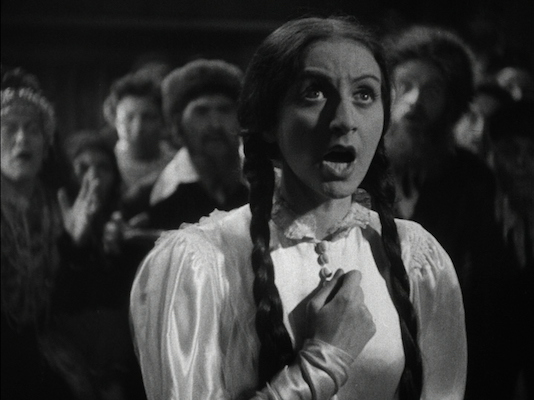
The new box set The Jewish Soul: Ten Classics of Yiddish Cinema revives a handful of sound films -- both influential and obscure -- that grew out of the Yiddish theater tradition. The first two films in the set were made in Poland before the Holocaust, while the other eight were made in the United States from 1935 to 1950. This collection is a treasure trove, revealing not only a portion of Jewish cultural history but the artistry and idiosyncrasy of a largely forgotten mode of filmmaking.
The first film in the set is The Dybbuk (1937), directed by Michal Waszynski and based on the world-famous play by S. Ansky. Inspired by centuries old folklore, this tragic film tells the story of a star-crossed couple, Khonen and Leah (played by real-life couple Leon Liebgold and Lili Liliana). Because of a long-ago vow, the two are fated to be together, but Leah's money-obsessed father instead promises his daughter to a wealthy family in exchange for a handsome dowry. Khonen is beside himself, so he starts using mysticism to contact Satan in hopes of turning things around. Khonen dies instead, but becomes a restless spirit -- the titular dybbuk -- and he possesses his beloved Leah. (For her part, Leah seems pretty willing to be possessed.) A local holy man is brought in to exorcise the spirit, but both Khonen and Leah seem unwilling to let go.
This spooky film utilizes a number of theatrical devices, including a soothsaying spirit who foretells the tragedy to come. A number of songs are presented in the film, both in the vein of religious cantorial tunes and more Broadway-style soliloquy numbers (although the score sounds nothing like Broadway). One musical highlight is the ill-fated celebration for Leah's wedding, in which the townspeople all attempt to dance with her, only to have a specter from the grave (as played by the film's choreographer Judith Berg) ensnare Leah into a seductive dance of death.
Next in the set is the documentary/drama hybrid Mir Kumen On (Children Must Laugh; literally, We Are Coming). It's essentially a propaganda film about the Medem Sanatorium in Miedzeszyn, Poland, near Warsaw. The sanatorium provided health care and education for tubercular children, and the film was commissioned to solicit donations from Jewish communities around the world. The film follows a bunch of new arrivals who come from dirt-poor slums as they adjust to life at the sanatorium. One boy is freaked out by the idea of bathing; another tries to sneak extra food in his pockets, unaware that he is welcome to take as much as he wants. There's some mild in-fighting and troublemaking, but eventually the newbies get the idea that it's better just to have fun like everyone else. Director Aleksander Ford shows off the sanatorium's routines, which makes the place look like a left-leaning summer camp, with gardening, arts and crafts time, plenty of singing, celebrations of Yiddish folk culture, and fairly heated political discussions. A new title card introducing the film reveals that Nazis arrested the staff and children on site in 1942, and the film was suppressed as Communist propaganda. This complicates Mir Kumen On's sunny idealism and renders it bittersweet.
Edgar G. Ulmer, the poverty row auteur behind Detour, is the director of the third film in the collection, the New York-set romantic comedy American Matchmaker (1940). Leo Fuchs, known at the time as the "Yiddish Fred Astaire," stars as self-made millionaire Nat Silver, who is unlucky in love. At the beginning of the film, his eighth wedding engagement has to be called off, this time because his betrothed's longtime sweetheart visits him in the night with a pistol in his hand. Nat decides to follow in the footsteps of his old world uncle, who gave up chasing women to become a matchmaker and help other couples get together. Being a modern urban fellow, Nat acquires an office and a group of experts to facilitate his new-fangled "human relations" service. (Nat's former coworker-turned-valet sees Nat's preferred description on a sign and wonders, "Human relishes? Like pickles?") Nat is a success, but finds himself with a tough case in sophisticated gal-about-town Judith (Judith Abarbanel). Of course, everyone but Nat sees that he is the perfect match for Judith -- though eventually he figures it out. The pacing is a little lumpy, and the budget was clearly a shoestring, but the cast makes this a delightfully goofy time.
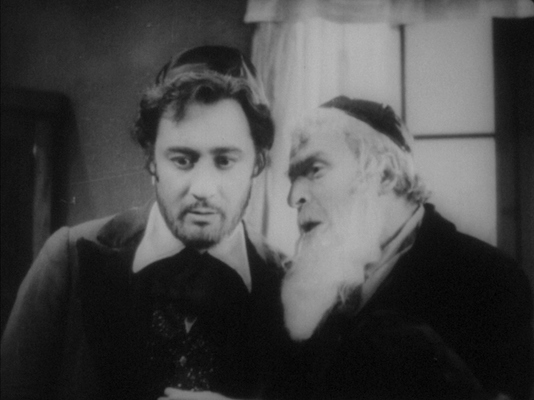
The fourth film is a showcase for legendary New York cantor Moishe Oysher, Overture to Glory (1940). A kind of period-piece inverse-Jazz Singer, Overture follows the story of an enormously gifted cantor, Yoel Duvid Strashunsky, in the small Lithuanian town of Vilna. When a gentile composer hears Yoel's voice, he woos the religious man toward a career in opera. Yoel leaves his wife, child, and congregation behind for the fame and fortune of Warsaw. But, despite the flirtatious affection of a pretty countess, Yoel finds himself yearning for the spiritual satisfaction of leading the congregation in Vilna. Story-wise, this is a fairly predictable melodrama, but director Max Nosseck (Dillinger) brings an unexpected amount of production value and artistry to the film. And Oysher is undeniably a star: handsome, compelling as an actor, and a true showstopper as a singer. The three best sequences in the film are the ones in which Oysher leads a congregation in prayer. How many films can you say that about? The finale, in which a chastened Yoel returns to Vilna during a Yom Kippur service, is one of the most stirring musical performances committed to film. It gave me goosebumps.
The next film in the set, Tevya (1939), has the same source material as the beloved American musical Fiddler on the Roof: the stories of Yiddish writer Sholom Aleichem. However, viewers expecting something in the charming and relatively upbeat vein of that musical are advised to turn off Tevya at the thirty-minute mark. It is not a bad film. Far from it. Director and star Maurice Schwartz has crafted both his lead performance and the surrounding film with plenty of care. But the charming old coot you'd recognize from Fiddler on the Roof is glimpsed only briefly here and disappears entirely once the plot of the film actually kicks in. Tevya is an overwhelmingly sad evocation of the strict divisions between the Jewish and gentile communities in Tsarist Russia. This film simplifies Tevya's family life by giving him only two daughters (rather than the seven of Aleichem's stories), but that choice also intensifies the trauma when his younger daughter Chava (Miriam Riselle) gives up her family to marry a gentile (The Dybbuk's Leon Liebgold). The deeply religious Tevya disowns her, and the family goes into a deep depression. Schwartz's Tevya holds fast to his religion as the family is dealt further blows, many thanks to their gentile neighbors. This film expresses the pain experienced by Eastern European Jews more vividly than the, shall we say, "assimilated" general-audience version presented in Fiddler on the Roof.
Paired with Tevya on the same disc is another father-daughter estrangement drama, The Yiddish King Lear (1935). Playwright Jacob Gordin's title doesn't just refer to the story model for his family melodrama, it's also the dubious nickname self-consciously placed upon the main character, David Moishele (Maurice Krohner), by the disapproving intellectual boy who is dating one of David's daughters. Anyone faintly familiar with the Shakespeare will recognize the story. David decides to divide up his sizable life savings among his three daughters and spend his twilight years in Israel. The snag is that the son-in-law he put in charge of his fortune refuses to part with a penny, depriving David and his two other daughters of the money they need to live on. There is fighting between the siblings and their significant others. Taybele (Miriam Grossman), the Cordelia of this story, decides to leave with her secular boyfriend for St. Petersburg, where she starts medical school. Clearly it was a different time, because all the men in the family treat Taybele like studying to be a doctor is a frivolous whim and not, you know, demanding work.
The Yiddish King Lear is on the lower end in terms of production value -- and director Harry Thomashefsky employs too many ill-advised extreme close-ups at random intervals -- but Krohner's lead performance is quite commanding. As David loses everything and starts to go blind, he lashes out in a showstopper of a soliloquy that transcends the low-rent set which frames him. Overall, The Yiddish King Lear is less bleak than many of the melodramas in this set, since Gordin's version of the story has a happier ending than Shakespeare's.
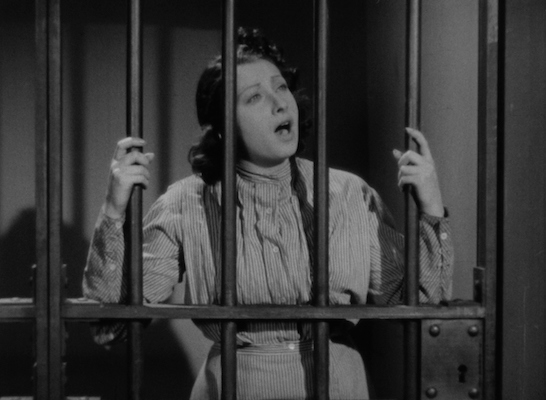
Closing out the set are four films that translator Allen Lewis Rickman refers to on his audio commentary as being schund ("trash") films, rather than kunst ("art"), and all directed by Joseph Seiden. Based on his work here, Seiden almost seems like the Tyler Perry of Yiddish cinema. He made populist stories that snap from broad comedy to stark melodrama to musical performances at the drop of a hat, and little attention is paid to consistent style or craft. Of Seiden's twelve directorial efforts, nine were made over the course of just two years.
The first Seiden film included here is Her Second Mother (1940). The main story involves a young woman, Surele (Esta Salzman), who learns that she is actually an orphan. The family she thought was hers actually took her in when her parents both died on the night of her birth. The woman she thought was her sister, Bella (Margaret Schoenfeld), gets entangled in a robbery perpetrated by the sister's boyfriend. Surele, depressed and feeling like she owes her surrogate family, decides to take the blame for everything. A young district attorney (Seymour Rechzeit) takes it upon himself to find out the truth of Surele's false confession. Eventually, the truth of everything is revealed -- including the fate of Surele's father (spoiler alert: he's not dead) -- in a series of credulity-straining but pretty entertaining turns. The film also features frequent comic relief asides with an old, bickering couple from the neighborhood, played by Jacob Zanger and Yetta Zwerling. Their scenes really don't serve the story, but their goofy characters entertained me more than the weepy plot.
Zanger and Zwerling show up as another bickering neighbor couple in Motel the Operator (1940), although they are relatively more subdued. The whole film, actually, is more measured and better executed than Her Second Mother, despite clearly following the same pandering formula. Motel Friedman (Chaim Tauber) works in a clothes-making shop, but goes on strike with his coworkers for fairer working conditions. He is badly beaten by strikebreakers, which puts an intense financial strain on his family. (**POTENTIAL SPOILERS**) Seeing no alternative, Motel's wife gives their baby son away and then is so horrified with what she did that she ends her life. After years of medical recovery, Motel is released to a world with no place for him. Decades pass, and a blackmailer tries to use Motel, now destitute, to squeeze money out of the man who illegally acquired Motel's son and is pretending to be his father. Motel is so overjoyed to see his son has grown up to be a fancy lawyer (played by Her Second Mother's Seymour Rechzeit; clearly he was typecast) that he fights the blackmailer and accidentally kills him. Now Motel's son has to defend his father in court, not knowing Motel is actually his father. (**END SPOILERS**)
Motel the Operator is not without a few unintentionally goofy moments that probably could have benefitted from a retake, but the acting is mostly quite good. And the songs by Sholom Secunda -- who wrote the Andrew Sisters' hit "Bei Mir Bist Du Schoen," along with the scores of many of these films -- are particularly enjoyable. The climactic wedding scene -- of course, this ends with a wedding -- features a beautiful cantorial song. For a formulaic melodrama, Motel the Operator is a satisfying watch.
A familiar theme of parents being mistreated by their disrespectful children returns in Eli Eli (1940), which is essentially a Yiddish take on Leo McCarey's Make Way for Tomorrow. Elderly couple Esther Field (credited above the title as "The Yiddishe Mama") and Max Badin are forced to leave their upstate New York farmhouse and separately move in with their adult children, one in New York City and one in Philadelphia. The old folks find themselves further treated like a burden, until they are essentially pushed out of their children's homes as well. As with King Lear, the downbeat ending of Make Way for Tomorrow is changed to something happier -- and, especially in this case, it's pretty unconvincing. The comic relief involves a couple of knucklehead cousins, and they seem more wildly out-of-place than normal.
The final film in the set is a rare post-WWII effort, seemingly an attempt by Joseph Seiden to restart an extinguished industry. Three Daughters (1949) doesn't feel as formulaic as the other Seiden films in the set, but it feels decidedly low-rent. The titular three daughters all have different flavors of marital difficulty, with Charlotte Goldstein's temptation to be unfaithful to her boorish new-money husband being the main plot. One notable aspect of this film is the heavier use of English than in the other films. All of the New York-set films feature dialogue that mixes English phrases into the Yiddish, but this one has big chunks of English dialogue. Without getting too deeply sociological, it seems like a striking indicator of the postwar desire for American Jews to further assimilate the culture of their new homeland.
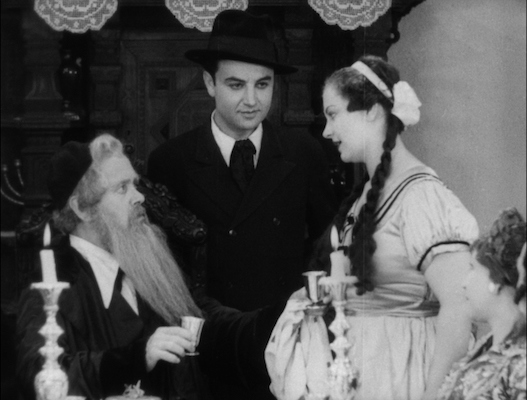
The Blu-ray
The Jewish Soul: Ten Classics of Yiddish Cinema is presented on five BDs, with two films and accompanying supplements on each disc. The discs are housed in a slightly thicker than average plastic keep case, with discs on back-to-back hubs. The keep case slides into a cardboard slip case. A booklet featuring writing by Allen Lewis Rickman, Serge Bromberg, and Samuel Blumenfeld is included.
The Video:
Most of the films come in AVC-encoded 1080p 1.33:1 presentations (some are slightly thinner, some are slightly wider). Because of the scarcity of film elements, none of these look totally pristine. Certain titles -- The Dybbuk, Three Daughters -- look like they come from early-generation prints with better overall clarity and detail. Others -- American Matchmaker, Overture to Glory -- look particularly dupe-y and have lost some detail. Most titles fall somewhere in between. All feature varying levels of dirt and damage. There are a few splices here and there, but none that seem to majorly impact any dialogue or story. None of these films are sourced from the negative, and they all come from prints with burned-in subtitles. Lobster Films, who were in charge of the restoration project, have chosen to put black and grey boxes over the existing subtitles to make it easier to read the newly translated digital subtitles over them. Three of these films were sourced from English-subtitled prints and those prints are presented with the separate option to watch them without the boxes (see Special Features below).
The Audio:
The soundtracks are presented in Yiddish (with some English, Polish, Ukrainian, and Russian) LPCM 2.0 mono mixes (with optional English subtitles). The English phrases spoken in the America-set films are not subtitled. Oddly, the film Overture to Glory includes either the English subs or an English SDH option; however, since this film has no English dialogue or major sound-effects-reliant sequence, it is presumably almost identical to the other subtitle track. Like the video, the soundtrack shows signs of age and damage, but it's mostly quite understandable. And apart from some inevitable boxiness, the musical performances are surprisingly well-preserved. Moishe Oysher's bold voice really comes through in Overture to Glory, for example.
Special Features:
- Film critic Hoberman offers a lot of information about the film and the traditions that it pulls from, but he speaks in concise bursts and leaves a lot of gaps where he just watches the film. It's a worthwhile reading of the film, but I wouldn't immediately watch this commentary back-to-back with the original.
Final Thoughts:
Many of the films presented in this collection are in pretty rough shape, but it's almost a miracle that they have survived at all, to show us a glimpse of this once-thriving theatrical and cinematic culture. With its mix of five "A" pictures and five shoestring-budgeted "B" pictures, this box set is consistently fascinating. Many of the B pictures won't inspire multiple rewatches -- although I'd argue they are still more entertaining than one might expect -- but their time capsule value alone makes them a great discovery. Highly Recommended.
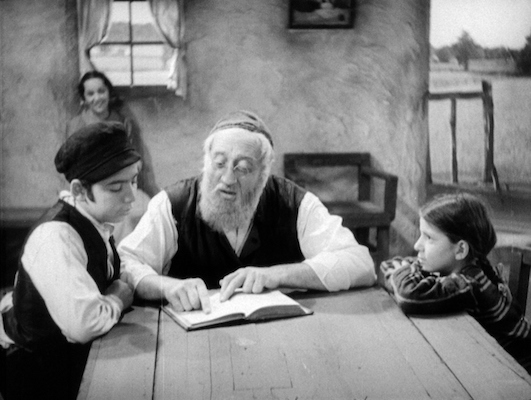
Justin Remer is a frequent wearer of beards. His new album of experimental ambient music, Joyce, is available on Bandcamp, Spotify, Apple, and wherever else fine music is enjoyed. He directed a folk-rock documentary called Making Lovers & Dollars, which is now streaming. He also can found be found online reading short stories and rambling about pop music.
|
| Popular Reviews |
| Sponsored Links |
|
|
| Sponsored Links |
|
|
| Release List | Reviews | Shop | Newsletter | Forum | DVD Giveaways | Blu-Ray | Advertise |
|
Copyright 2024 DVDTalk.com All Rights Reserved. Legal Info, Privacy Policy, Terms of Use,
Manage Preferences,
Your Privacy Choices | |||||||













